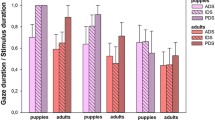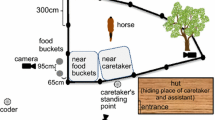Abstract
Pet-directed speech (PDS) is a type of speech humans spontaneously use with their companion animals. It is very similar to speech commonly used when talking to babies. A survey on social media showed that 92.7% of the respondents used PDS with their horse, but only 44.4% thought that their horse was sensitive to it, and the others did not know or doubted its efficacy. We, therefore, decided to test the impact of PDS on two tasks. During a grooming task that consisted of the experimenter scratching the horse with their hand, the horses (n = 20) carried out significantly more mutual grooming gestures toward the experimenter, looked at the person more, and moved less when spoken to with PDS than with Adult-directed speech (ADS). During a pointing task in which the experimenter pointed at the location of a reward with their finger, horses who had been spoken to with PDS (n = 10) found the food significantly more often than chance, which was not the case when horses were spoken to with ADS (n = 10). These results thus indicate that horses, like certain non-human primates and dogs are sensitive to PDS. PDS could thus foster communication between people and horses during everyday interactions.



Similar content being viewed by others
Availability of data and materials
My manuscript has associated data in a data repository.
References
Ben-Aderet T, Gallego-Abenza M, Reby D, Mathevon N (2017) Dog-directed speech: why do we use it and do dogs pay attention to it? Proc R Soc B Biol Sci 284:20162429. https://doi.org/10.1098/rspb.2016.2429
Benjamin A, Slocombe K (2018) Who’s a good boy?! Dogs prefer naturalistic dog-directed speech. Anim Cogn 21:353–364. https://doi.org/10.1007/s10071-018-1172-4
Briefer EF (2018) Vocal contagion of emotions in non-human animals. Proc R Soc B Biol Sci 285:20172783. https://doi.org/10.1098/rspb.2017.2783
Dunst C, Gorman E, Hamby D (2012) Preference for infant-directed speech in preverbal young children. Cell Rev 5:1–13
Feh C, De Mazières J (1993) Grooming at a preferred site reduces heart rate in horses. Anim Behav 46:1191–1194
Fortin M, Valenchon M, Levy F, Calandreau L, Arnould C, Lansade L (2018) Emotional state and personality influence cognitive flexibility in horses (Equus caballus). J Comp Psychol 132:130–140. https://doi.org/10.1037/com0000091
Hare B, Brown M, Williamson C, Tomasello M (2002) The domestication of social cognition in dogs. Science 298:1634–1636. https://doi.org/10.1126/science.1072702
Jeannin S, Gilbert C, Amy M, Leboucher G (2017) Pet-directed speech draws adult dogs’ attention more efficiently than Adult-directed speech. Sci Rep 7:4980. https://doi.org/10.1038/s41598-017-04671-z
Kaminski J, Schulz L, Tomasello M (2012) How dogs know when communication is intended for them. Dev Sci 15:222–232. https://doi.org/10.1111/j.1467-7687.2011.01120.x
Lansade L, Nowak R, Lainé A-L, Leterrier C, Bonneau C, Parias C, Bertin A (2018) Facial expression and oxytocin as possible markers of positive emotions in horses. Sci Rep 8:14680. https://doi.org/10.1038/s41598-018-32993-z
Lansade L, Bonneau C, Parias C, Biau S (2019) Horse’s emotional state and rider safety during grooming practices, a field study. Appl Anim Behav Sci 217:43–47. https://doi.org/10.1016/j.applanim.2019.04.017
Lansade L, Colson V, Parias C, Reigner F, Bertin A, Calandreau L (2020a) Human face recognition in horses: data in favor of a holistic process. Front Psychol 11. https://doi.org/10.3389/fpsyg.2020.575808
Lansade L, Colson V, Parias C, Trösch M, Reigner F, Calandreau L (2020b) Female horses spontaneously identify a photograph of their keeper, last seen six months previously. Sci Rep 10:6302. https://doi.org/10.1038/s41598-020-62940-w
Lesch R, Kotrschal K, Schoberl I, Beetz A, Solomon J, Fitch WT (2019) Talking to dogs: companion animal-directed speech in a stress test animals 9 https://doi.org/10.3390/ani9070417
Maros K, Gácsi M, Miklósi Á (2008) Comprehension of human pointing gestures in horses (Equus caballus). Anim Cogn 11:457–466. https://doi.org/10.1007/s10071-008-0136-5
Nakamura K, Takimoto-Inose A, Hasegawa T (2018) Cross-modal perception of human emotion in domestic horses (Equus caballus). Sci Rep 8:8660. https://doi.org/10.1038/s41598-018-26892-6
Proops L, Walton M, McComb K (2010) The use of human-given cues by domestic horses, Equus caballus, during an object choice task. Anim Behav 79:1205–1209. https://doi.org/10.1016/j.anbehav.2010.02.015
Proops L, Grounds K, Smith AV, McComb K (2018) Animals remember previous facial expressions that specific humans have exhibited. Curr Biol 28:1428-1432.e1424. https://doi.org/10.1016/j.cub.2018.03.035
Ringhofer M, Yamamoto S (2017) Domestic horses send signals to humans when they face with an unsolvable task. Anim Cogn 20:397–405. https://doi.org/10.1007/s10071-016-1056-4
Saint-Georges C et al (2013) Motherese in interaction: at the cross-road of emotion and cognition? (a systematic review). PLoS ONE. https://doi.org/10.1371/journal.pone.0078103
Sandi C, Pinelo-Nava MT (2007) Stress and memory: behavioral effects and neurobiological mechanisms. Neural Plas 2007:78970. https://doi.org/10.1155/2007/78970
Schachner A, Hannon EE (2011) Infant-directed speech drives social preferences in 5-month-old infants. Dev Psychol 47:19–25. https://doi.org/10.1037/a0020740
Scheider L, Grassmann S, Kaminski J, Tomasello M (2011) Domestic dogs use contextual information and tone of voice when following a human pointing gesture. PLoS ONE 6:e21676. https://doi.org/10.1371/journal.pone.0021676
Schrimpf A, Single M-S, Nawroth C (2020) Social referencing in the domestic horse. Animals 10:164. https://doi.org/10.3390/ani10010164
Singh L, Morgan JL, Best CT (2002) Infants’ listening preferences: baby talk or happy talk? Infancy 3:365–394. https://doi.org/10.1207/s15327078in0303_5
Slonecker EM, Simpson EA, Suomi SJ, Paukner A (2018) Who’s my little monkey? Effects of infant-directed speech on visual retention in infant rhesus macaques. Dev Sci 21:e12519. https://doi.org/10.1111/desc.12519
Smith AV, Proops L, Grounds K, Wathan J, Scott SK, McComb K (2018) Domestic horses (Equus caballus) discriminate between negative and positive human nonverbal vocalisations. Sci Rep 8:13052. https://doi.org/10.1038/s41598-018-30777-z
Trösch M, Cuzol F, Parias C, Calandreau L, Nowak R, Lansade L (2019a) Horses categorize human emotions cross-modally based on facial expression and non-verbal vocalizations. Animals 9:862. https://doi.org/10.3390/ani9110862
Trösch M, Ringhofer M, Yamamoto S, Lemarchand J, Parias C, Lormant F, Lansade L (2019b) Horses prefer to solicit a person who previously observed a food-hiding process to access this food: a possible indication of attentional state attribution. Behav Processes 166:103906. https://doi.org/10.1016/j.beproc.2019.103906
Trösch M, Bertin E, Calandreau L, Nowak R, Lansade L (2020a) Unwilling or willing but unable: can horses interpret human actions as goal directed? Anim Cogn 23:1035–1040. https://doi.org/10.1007/s10071-020-01396-x
Trösch M, Pellon S, Cuzol F, Parias C, Nowak R, Calandreau L, Lansade L (2020b) Horses feel emotions when they watch positive and negative horse–human interactions in a video and transpose what they saw to real life. Anim Cogn 23:643–653. https://doi.org/10.1007/s10071-020-01369-0
Acknowledgements
We thank Fabrice Reigner and his staff at the Animal Physiology Experimental Unit PAO, INRA (https://doi.org/10.15454/1.5573896321728955E12) for their contribution to this experiment. We would like to thank Sue Edrich from the translation agency Interconnect for correcting the English manuscript.
Funding
IFCE funded this experiment (Grant 00004819-EquiEthic).
Author information
Authors and Affiliations
Corresponding author
Ethics declarations
Conflict of interest
The authors declare that they have no conflict of interest.
Ethics approval
Our experimental procedures were approved by the Val-de-Loire Ethics Committee (CEEA Vdl, France, N°19). Procedures used during the experiment were not invasive, stressful or painful and there was no food restriction.
Additional information
Publisher's Note
Springer Nature remains neutral with regard to jurisdictional claims in published maps and institutional affiliations.
Rights and permissions
About this article
Cite this article
Lansade, L., Trösch, M., Parias, C. et al. Horses are sensitive to baby talk: pet-directed speech facilitates communication with humans in a pointing task and during grooming. Anim Cogn 24, 999–1006 (2021). https://doi.org/10.1007/s10071-021-01487-3
Received:
Revised:
Accepted:
Published:
Issue Date:
DOI: https://doi.org/10.1007/s10071-021-01487-3




